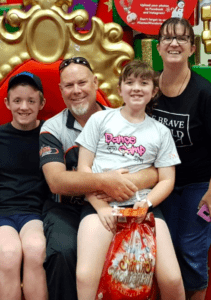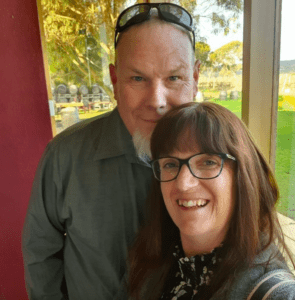A rare disease diagnosis can conjure up a multitude of emotions, from relief at finally learning what is going on to fear or isolation when trying to figure out what it means for the future. But what many people don’t realize is how long it can take to even reach the point of diagnosis. It takes, on average, 5-7 years to receive a rare disease diagnosis, with some people waiting for over a decade. For Kate Turner, a mother of two from Adelaide, Australia, she waited for six years to receive her son Joshua’s diagnosis of PTEN Hamartoma Tumor Syndrome (also known as PHTS or PTEN syndrome). Shockingly, Joshua’s diagnosis opened the door to another realization: that Kate and her daughter Jenna, now 13 years old, both also had PTEN syndrome.
Their journey was not always easy. In fact, Kate shares, there was a constant difficulty in getting healthcare providers (HCPs) to listen. She shares:
“It’s tough fighting for validity in the medical system and, as a patient, it’s so important to be heard. I wanted to share my story to let other people with rare diseases know that their experiences are valid and that they are not alone.”
In anticipation of Rare Disease Day, Kate sat down with Patient Worthy to discuss her family’s diagnostic journey, what PTEN syndrome is, how her family is doing today, and advice for others who are facing a rare diagnosis.
Kate’s Story
Arteriovenous malformations (AVMs) occur when a group of blood vessels within the body form incorrectly, causing tangled and crossed arteries and veins. Many people with AVMs never experience any health issues. In fact, shares Johns Hopkins Medicine, only around 12% of people living with AVMs will be symptomatic. Symptoms can include tinnitus, facial paralysis, drooping eyelids, dizziness, chronic pain, muscle weakness, and seizures (among others).
Kate’s son Joshua was part of the 12% who showed symptoms. For over six years, he fought through the symptoms. The family, including Kate’s husband Michael, wanted to understand what was causing his AVMs. In general, doctors are unsure of the exact cause of AVMs. However, the Turner family believed that there was some underlying issue. Unfortunately, doctors did not seem to take the family very seriously. Kate shares:
“When it comes to rare conditions, or any health issues, doctors need to listen to patients. Mocking, or acting like you’re making up the symptoms, can make it much harder to get anything done. It was frustrating to try and prove that we had a reason to be there.”
Eventually, doctors recommended that Joshua undergo an excision surgery in which the AVMs were separated from surrounding tissue. At this point, doctors decided to take a family history. Kate, Michael, Joshua, and Jenna all submitted blood samples.

Still, it took 18 months—and the family’s application for research funding—before they finally received a diagnosis for Joshua: PTEN Hamartoma Tumor Syndrome (PHTS). Kate and Jenna were also diagnosed with the same condition.
What is PTEN Hamartoma Tumor Syndrome?
PTEN hamartoma tumor syndrome, or PTEN syndrome, is an umbrella term which refers to conditions resulting from PTEN gene mutations. Normally, PTEN is a tumor-suppressing gene. Kate explains:
“PTEN mutations mean that the protein which controls cell division is defective. This allows tumors to grow without any defense from the body’s usual immune response.”
There are three distinct subtypes of PTEN syndrome: Bannayan-Riley-Ruvalcaba syndrome, Proteus-like syndrome, and Cowden syndrome.
Those with PTEN syndrome may have multiple hamartomas (benign growths made of an abnormal mixture of cells and tissues) in various areas of the body. PTEN syndrome also increases the risk of developing thyroid, breast, renal cell, endometrial, colon, rectal, or skin cancer. Additional symptoms or characteristics can, but do not always, include:
- Macrocephaly
- AVMs
- Growths on the skin such as lipomas, thickened skin on the palms and soles, trichilemmomas
Outside of the above symptoms, Kate says:
“Most symptoms occur when the cancer develops or from treatments like chemotherapy, radiotherapy, or immune-suppressive medicines.”
Prior to her diagnosis, Kate was diagnosed with breast cancer twice; she now understands that this is related to her condition. After diagnosis, she shares:
“The doctors were able to tell us about PTEN and its effects. Although I wish that we had found this diagnosis prior to my breast cancer diagnoses, it does mean that Josh and Jenna can access regular screening in the hopes of either catching cancer early or keeping it at bay!”
The Family Today
Throughout their journey, the Turner family has always leaned on each other for support. They understand the struggles: the amount of Googling that doctors sometimes have to do, the insurance struggles, the difficulties associated with treatment. But in that understanding comes comfort and unity. Says Kate:
“Without my family, I definitely would have given up by now. Fighting cancer is really hard. Unless people understand that I will never be fully cured, they tend to drift away. This has really been a blessing because I’ve learned who will be in for the long haul with me.”

Kate also finds some comfort and joy in her role as Student Support Officer at a local primary school. Currently, the family enjoys exploring all that Adelaide has to offer, taking their crazy beagle Rascal on long walks, and advocating for new research into PTEN syndrome. Kate hopes that, in the future, there will be a greater pharmaceutical approach to PTEN: perhaps looking at a synthetic way to help the body to produce the protein it needs to fight off cancer before it begins.
Until then, Kate will continue to advocate, to raise her voice, and to create change. To others who are looking to advocate but aren’t sure where to start, Kate says:
“Always advocate for yourself. Ask questions. Tell the doctor when you think something is wrong. Yell and scream if you have to, but keep advocating for yourself. You know your body the best.”






